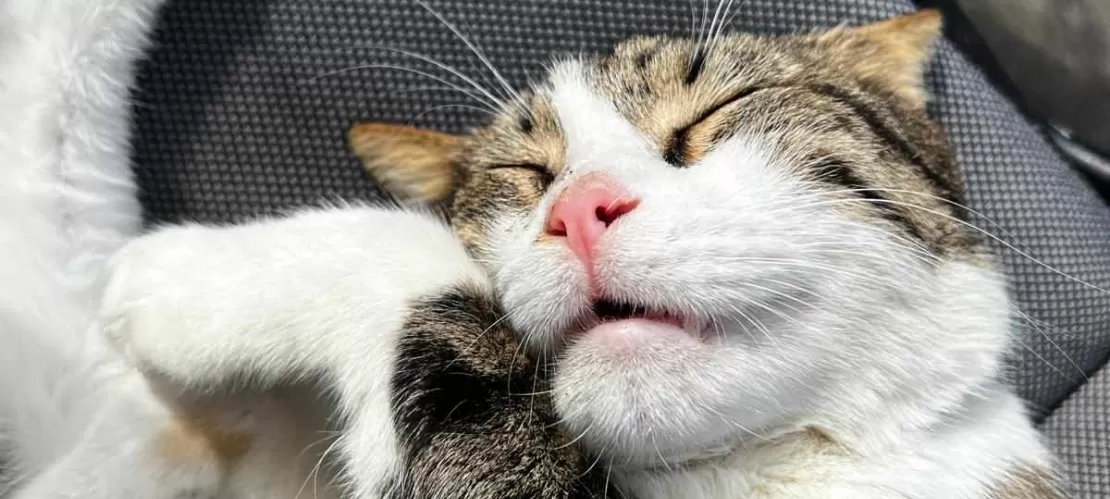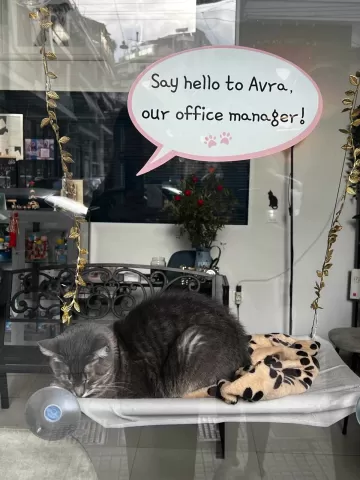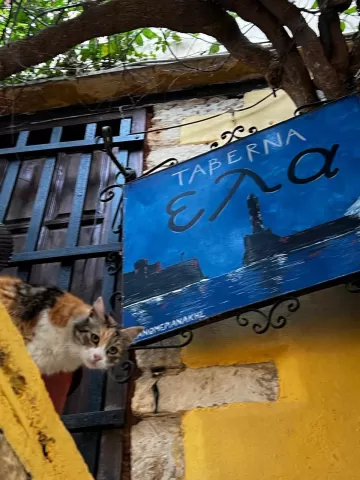
One of the things that I love about Greece is the amount of love given to the animals. In this country, cats are cherished members of the community. Residents often leave out food and water for the cats, creating a network of communal care. It is not uncommon to see a cat entering a cafeteria, taking a nap in the middle of the shop display, or even taking the metro!
The spirit of Greek hospitality, known as philoxenia, is ingrained in the culture. Whether you're an animal in need, a friend, or a stranger, Greeks have a natural inclination to welcome others with open arms. Living in Greece means being a part of a warm community.
This is something extremely moving to me. I feel welcomed and celebrated among people who don't understand my language, people who are so different from me in so many ways that I sometimes feel like a different species when struggling to cross a busy Greek street. At the same time, these are the people who always find time to stop in the middle of the road to make a conversation. Who ask questions and try to listen, truly listen, despite the language barrier. One of the most important lessons, I have learned in Greece so far is that the time spent with another person, or even with an animal, is never wasted.

In Greece, the concept of "siga-siga" (slowly, slowly) permeates daily life. And I suspect that the Greeks may have learned that from the cats, who appreciate quiet moments, finding solace in cozy nooks, or perching on high vantage points to observe the world. Cats have a long and storied history in Greece. They have been here for a while now teaching the Greeks how to enjoy the present. In ancient times, they were considered protectors and symbols of good fortune. These days it's not uncommon to see them lounging in historic ruins or strolling through traditional villages, like some deities carrying thruts hidden from our sight.

Being still new to Greece and Athens I try to educate myself on how to support the animals and people, who are teaching me so much.
I have been charmed by the local cat population and now every outdoor cafeteria, historic site, or beach becomes a playground for me because of their presence. And so, naturally, I want to be mindful about how I approach them.
Many non-profit organizations in Greece work to improve conditions for existing and future felines in the country. One of them is Nine Lives Greece. The next time you see a stray cat in Greece or your home town, you may want to implement some of their advice:
- Do take ill or injured street cats to the nearest vet. If you cannot find a vet – or if there isn’t one nearby – contact the local animal welfare group
- Don’t feed stray cats from your restaurant table. You could irritate the owners or other customers, which could result in the cats being harmed.
- Do keep leftover meat or fish and feed it to stray cats by the nearest rubbish bin or at the curb underneath a parked car.
- Do keep a bag or box of dry cat food with you to feed any hungry strays you meet.
- Do try to make sure that stray cats have access to clean water (in summer, they usually drink from dripping air-conditioning units).
- Don’t give cats or kittens milk. It will give them diarrhea.
I hope that the chill mood of stray cats wandering through Athens will be contagious and that you too will find yourself catching the sun on the streets of Greece or your hometown. The spring is close, let's get outside of our homes and let ourselves wonder!
